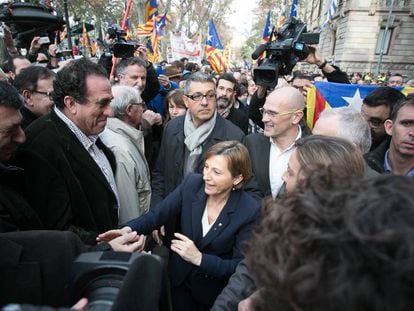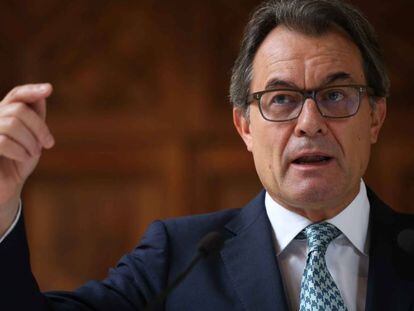Former Catalan premier’s right-hand man faces court over independence vote
Francesc Homs accused of disobedience for involvement in 2014 unofficial referendum

Francesc Homs, a deputy in the Spanish Congress for the Catalan pro-independence PDECAT party – formerly Convèrgencia – is now one step closer to joining other senior Catalan politicians in facing legal action for organizing a non-binding sovereignty referendum on November 9, 2014 that flouted a Constitutional Court ban.

After hearing evidence in the case, Spain’s Supreme Court has decided there are grounds to charge Homs with disobedience and abuse of office. If found guilty, he would face a ban from holding public office. The court’s decision says that Homs disobeyed the Constitutional Court “openly, obstinately, and stubbornly”.
On November 4, 2014, Spain’s Constitutional Court vetoed a non-binding independence referendum being organized at the time by the Catalan regional government for November 9, suspending “any related activity clearly and resoundingly.”
Catalan politicians gave the impression the referendum process had stopped
Supreme Court judge Andrés Palomo, who is overseeing the case against Homs, concludes in the decision that the politician “not only omitted to suspend any activity,” but also “drove the process on the basis of his exclusive will.”
Also facing trial for his involvement in the referendum is Artur Mas, the former regional premier of Catalonia. Prosecutors insist Mas is guilty of gross misconduct and disobedience, and he is facing a 10-year ban from public office. As councilor to the presidency of the regional government Homs was Mas’s right-hand man at the time.
Former Catalan deputy premier Joana Ortega and ex-regional education commissioner Irene Rigau have also been named by prosecutors as accessories in the matter and could face bans from public life of nine years.
Like Mas, the most visible figure in the lead-up to the vote in the region of 7.5 million people, Homs has argued that the Catalan regional government was no longer involved in the ballot after the Constitutional Court veto came into effect on November 4, and which was then organized by volunteers. Prosecutors claim, however, that private companies tasked with the organization continued to operate after that time, carrying out work included mass-mailing campaigns, the maintenance of websites dedicated to the vote, and IT tasks.
Homs faces a ban from office if found guilty
Along with Homs, Mas and his aides “developed a complete and effective strategy of defiance after the suspension,” says the Supreme Court.
Homs and the others facing prosecution moved “off center stage” and attempted to generate the impression that “the referendum process had stopped,” says the Supreme Court.
The court highlights the fact that in the two days ahead of the referendum, two companies, T-Systems and Fujitsu, delivered and set up 7,000 laptops in schools where voting stations were set up for the November 9 ballot.
English version by Nick Lyne.












































